Top 10+ Best Retail CRM Software Picks to Boost Sales in 2025
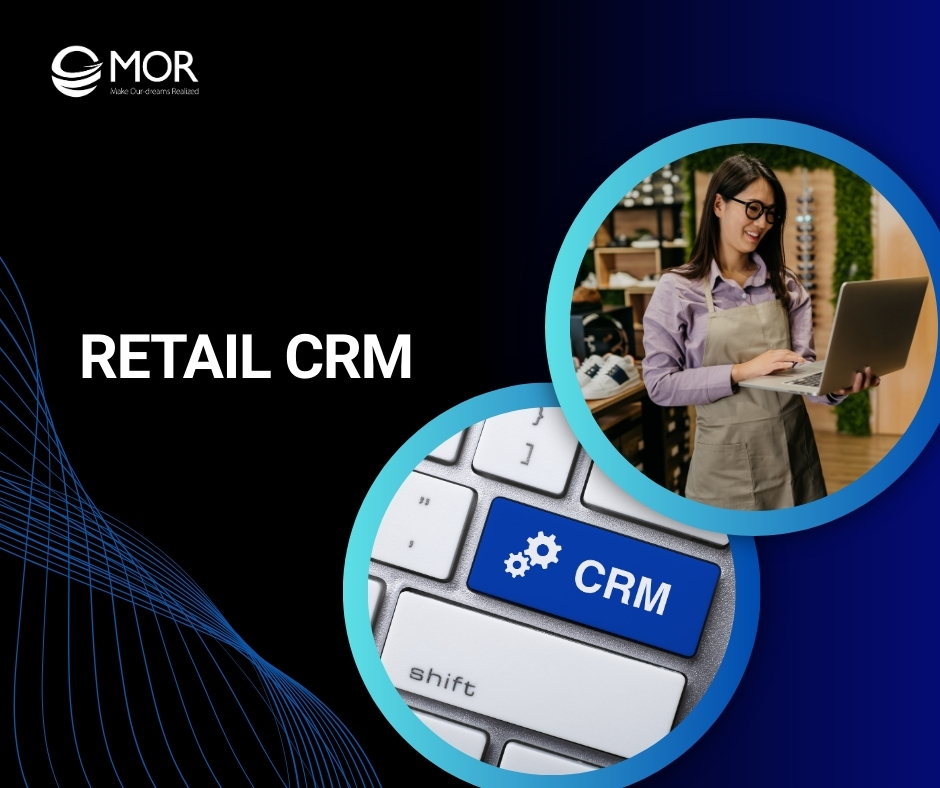
Choosing the right retail CRM is no longer optional in the retail industry. The right tool can boost loyalty, improve sales, and simplify daily operations. This MOR Software’s guide highlights the top solutions for 2025 to help retailers make the smart choice.
What Is A Retail CRM?
A retail CRM is a software solution built to handle the specific demands of the retail sector. It supports high-volume, repeat purchases typical of the B2C model by centralizing customer data, transactions, and communications across different sales channels in the CRM in retail industry.
With retail CRM software, companies can streamline sales operations and sharpen marketing campaigns by uncovering valuable insights into customer habits. This allows retailers to craft personalized experiences, deliver relevant promotions, and strengthen customer support. For example, the system can recommend the right time to connect with a buyer and suggest offers that match their order history and purchasing behavior across multiple channels.
Beyond improving sales and marketing, a retail CRM system also cuts down on repetitive manual work. According to McKinsey, around 40% of tasks in retail can be automated through CRM technology. This level of automation reduces operational strain and drives efficiency.
Through automating jobs like data entry, follow-up emails, and standard communications, retailers can focus on building relationships and boosting customer loyalty. The consistency this automation brings improves both accuracy and customer experience. From sending tailored offers to managing inventory updates, retail CRM plays a central role in helping retailers run smoother operations and stay competitive.
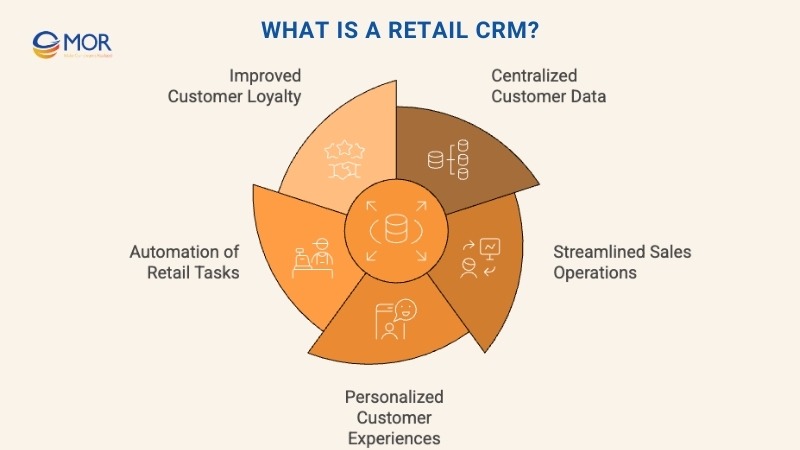
Top 14 Best Retail CRM For Business In 2025
Research shows that nearly 65% of companies adopt a CRM system within the first five years of operation. This proves how essential the right tool is for driving growth in retail. To help you find the right fit, we’ve highlighted 14 trusted retail CRM options that are widely used in CRM retail management today.
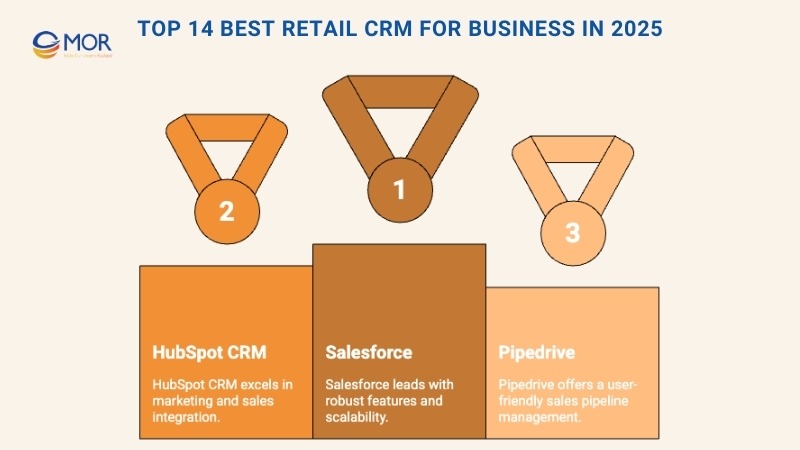
Top 14 Best Retail CRM For Business In 2025
1. Salesmate
Salesmate is a leading retail CRM software designed for both physical and online stores. With strong automation features, it simplifies sales processes and reduces manual work, helping retailers manage customer relationships and improve workflow efficiency. Its focus on automation and collaboration makes it an excellent choice for businesses that want to stand out in a competitive market.
Features
- Contact management: Convert contacts into deals and gain a 360-degree customer view.
- Lead management: Track leads, customers, and vendors in a single platform.
- Sales pipeline management: Build multiple custom pipelines and view the entire sales cycle at a glance.
- Team inbox: Centralize communication and collaborate inside the CRM easily.
- Integrations: Connect with a wide range of integrations to extend functionality.
- Reports: Access interactive and customizable reports to make smarter decisions.
Pros
- Complete pipeline visibility
- Strong automation tools
- Smooth team collaboration
- Mobile-friendly CRM system
Cons
- Can be challenging for new users to master
2. HubSpot CRM
HubSpot is widely recognized as an all-in-one retail CRM, giving businesses the ability to manage customer interactions while improving sales performance. It also includes SMS marketing functionality, enabling retailers to connect with customers through personalized text campaigns.
Thanks to its unified dashboard, HubSpot combines sales, marketing, and customer service into one place. This makes it easier for retailers to simplify operations, track performance, and make informed business decisions. As a flexible retail CRM software, it adapts well to companies of different sizes.
Features
- Contact management
- Daily sales dashboard
- Deal stage tracking
- Automated data capture
Pros
- Simple, intuitive interface
- Wide range of integrations
- Flexible and scalable design
Cons
- High pricing tiers
- Complex workflows for beginners
3. Salesforce
Salesforce is one of the most powerful retail CRM platforms available today. It combines automation with AI-driven tools to help retailers scale operations across every department.
A standout capability is its strong omnichannel integration, which connects both online and offline channels. This allows businesses to manage customer interactions seamlessly, improving engagement at every touchpoint. As a leading CRM software for retail industry, Salesforce offers detailed insights and intelligent recommendations that enable retailers to personalize campaigns and reach the right audience more effectively.
Features
- End-to-end sales tracking
- Centralized data management
- Intuitive user interface
- Process automation
- Built-in project management
Pros
- Quick setup process
- Accessible on mobile devices
- Streamlined transaction recording
Cons
- High subscription costs
- Requires time to master fully
4. Pipedrive
Pipedrive stands out as a retail CRM known for its simple interface and strong emphasis on pipeline management. Its design makes it easy for teams to visualize and track the entire sales journey without missing key opportunities.
This retail CRM system is particularly useful for handling large volumes of customer interactions. Simplifying lead tracking and deal management, Pipedrive helps retailers stay organized and efficient even in competitive, fast-moving markets.
Features
- Lead management tools
- Visual sales tracking
- Wide range of integrations
Pros
- Saves time with automation
- Affordable AI-driven features
- Built-in proposal generation
Cons
- Higher cost for advanced tiers
- Lacks workflow automation in entry plans
5. Freshsales
Freshsales is a powerful retail CRM that provides a complete suite of tools to manage customer relationships and streamline the sales cycle.
It automates essential tasks like email campaigns and follow-ups, helping retailers handle high sales volumes without adding extra workload. With AI-driven lead scoring, this CRM software for retail enables businesses to identify high-intent buyers and focus attention where it matters most.
Features
- Unified customer communication
- Actionable sales insights
- Automated workflows
- Centralized messaging
Pros
- Strong omnichannel support
- Regular quarterly updates
- Intelligent contact scoring
- Reliable relationship management
Cons
- Occasional data inconsistencies
- Limited features during trial period
6. Bigin by Zoho
Bigin by Zoho is a practical retail CRM built for small businesses that need a simple and budget-friendly way to manage customer relationships.
It comes with straightforward sales pipeline tools that make it easy to track sales activities and daily interactions. As a CRM software for retail industry, Bigin focuses on simplicity, allowing retailers to organize leads, deals, and communications without overlooking potential opportunities.
Features
- Contact management tools
- Task organization
- Sales deal tracking
Pros
- Clean, user-friendly interface
- High accessibility across devices
- Cost-effective solution
Cons
- Limited customer engagement features
- Generalized sales approach
7. Zendesk Sell
Zendesk Sell is a retail CRM designed to meet the needs of large retailers and enterprises handling multichannel sales.
It offers a robust sales pipeline, real-time customer data tracking, and efficient data management that helps businesses stay on top of every interaction. As a flexible retail CRM software, Zendesk Sell also integrates with different marketing platforms, making it easier to deliver personalized customer experiences at scale.
Features
- Built-in productivity tracker
- Advanced analytics tools
- Customer engagement features
Pros
- Cost-effective pricing
- Simple and user-friendly interface
- Multi-language accessibility
Cons
- Limited automation options
- Requires Outlook add-on for some features
8. Copper CRM
Copper is a popular retail CRM for stores that rely heavily on Google Workspace. Its smooth integrations with Gmail, Google Calendar, and other Google tools let retailers manage customer interactions directly from their inbox.
This convenience reduces the need to switch between platforms, streamlining sales activities and overall customer management. In the CRM in retail industry, Copper is often praised for making daily workflows simpler and more connected.
Features
- Contact management capabilities
- Custom filters for data
- Sales tracking functions
- Native Google integrations
Pros
- Clean, intuitive interface
- Strong pipeline management
- Easy customer engagement
Cons
- No free version offered
- Limited contact scoring flexibility
9. Monday CRM
Monday CRM is considered one of the most versatile retail CRM platforms, offering customizable tools suited for business leaders, managers, IT teams, and sales staff alike.
Although originally built as a project management solution, it also serves as a strong CRM retail tool by combining automation with sales tracking. Retailers can use it to streamline workflows, manage customer relationships, and coordinate operations across departments.
It supports full sales cycle tracking, helping teams identify new growth opportunities, speed up follow-ups, and optimize engagement efforts.
Features
- Role-based assignments
- Sales timelines
- Gantt chart tracking
- Multiple software integrations
Pros
- Easy spreadsheet-style data entry
- Clear sales process tracking
- Flexible customization options
Cons
- Higher pricing for advanced plans
- Limited post-sales management tools
10. Insightly
Insightly is a flexible retail CRM that works well for businesses of all sizes. It combines customer relationship management with built-in project management tools, giving retailers a unified platform to handle both data and operations.
This retail CRM system makes it easier for teams to track customer interactions, manage pipelines, automate routine tasks, and focus on higher-value work. By blending CRM and project management, Insightly helps retailers keep sales activities and operational workflows closely aligned.
Features
- Wide customization options
- Built-in project management
- Marketing campaign tools
- Document scanning support
Pros
- Reliable mobile CRM app
- Strong relationship linking for connections
Cons
- Requires extra products for some functions
- Free-forever plan no longer available
11. Pipefy
Pipefy is best known as a workflow automation and process management platform that can also support retail CRM needs.
Though not a traditional CRM, its flexibility allows retailers to design and organize their customer management processes in a structured way. With Pipefy, businesses can build custom workflows that cover sales, marketing, and customer support, making it a valuable CRM software for retail operations.
Features
- Real-time activity tracking
- Workflow customization
- End-to-end process management
Pros
- Smooth integration options
- Automated email communication
- Helpful for onboarding tasks
Cons
- Steep learning curve
- Limited advanced features
- Higher pricing tiers
12. Bitrix24
Bitrix24 is an all-in-one retail CRM platform built to serve retailers that want more than just customer management.
It combines CRM capabilities with project management, collaboration, and communication tools, making it suitable for businesses that prefer a single hub for both customer relationships and operations. As a CRM software for retail industry, Bitrix24 delivers strong functionality for managing sales processes and team workflows together.
Features
- End-to-end digital sales tools
- Ready-to-use sales templates
- Built-in automation features
Pros
- Smooth system integrations
- No feature restrictions
- Social intranet for teams
Cons
- Interface can feel cluttered
13. ClickUp
ClickUp is widely known as a project management and productivity tool, but it can also serve as a retail CRM when tailored to retail needs. Its customizable features and flexible workflows allow businesses to adapt the platform for managing customer data and sales activities.
Though not a traditional CRM, its versatility makes ClickUp a valuable retail CRM software option for retailers aiming to track sales, manage pipelines, and automate customer-related tasks in one place.
Features
- Gantt chart planning
- Broad integration options
- Multiple customizable dashboards
- Kanban board support
Pros
- Highly customizable setup
- Strong collaboration tools
- Budget-friendly pricing
- Extensive integrations
Cons
- Complex initial setup
- Lacks some advanced CRM features
14. ActiveCampaign
ActiveCampaign is a feature-rich retail CRM that combines customer relationship management with advanced marketing automation, making it a strong choice for modern retailers.
Its biggest advantage lies in automating and personalizing customer interactions at scale. In CRM retail, this level of automation plays a key role in driving engagement, encouraging repeat purchases, and strengthening brand loyalty.
Features
- Multi-step marketing workflows
- Targeted email campaigns
- A/B testing functionality
- Predictive lead scoring
Pros
- Highly personalized marketing tools
- Streamlined sales automation
- Accurate customer segmentation
Cons
- Setup can be complex
- Reporting features are limited
Comparison Table of 14 Retail CRM
The table below provides a quick overview of the top retail CRM software options covered above. Each solution differs in pricing, integrations, and features, making it easier to compare which platform fits your retail needs best.
Best Retail CRM | Best For | Pricing | Integrations | Mobile App |
| Salesmate | Enterprise-level retail businesses | $23/user/month | Google, Outlook, Zapier | Available |
| HubSpot CRM | Growing retail businesses | $30/user/month (requires two Hub subscriptions) | Slack, Shopify, and more | Available |
| Salesforce | Large and enterprise retailers | $165/user/month | ERP systems, 100+ apps | Available |
| Pipedrive | Small to mid-sized retail teams | $24/user/month | Google, MailChimp, Zapier, Trello | Available |
| Freshsales | E-commerce and scaling retail | $59/user/month | Freshdesk, Zapier, Google Workspace | Available |
| Bigin by Zoho | Small retail operations | $12/user/month | Zoho ecosystem, Google | Available |
| Zendesk Sell | Service-driven retail businesses | $19/user/month | Zendesk, Mailchimp, others | Available |
| Copper CRM | Retailers using Google tools | $99/month | Google Workspace integration | Available |
| Monday CRM | Collaborative retail teams | $24/month | Google, Slack, Zoom, PM tools | Available |
| Insightly | Mid-sized retail companies | $29/user/month | Google, Microsoft, QuickBooks, Mailchimp | Available |
| Pipefy | Process-focused retailers | $26/user/month | API-based, Google, Microsoft | Available |
| Bitrix24 | Retail businesses of any size | $183/3 months | Built-in apps, social media | Available |
| ClickUp | Team collaboration in retail | $12/user/month | Google, Slack, Trello, more | Available |
| ActiveCampaign | Online and e-commerce stores | $49/3 users | Shopify, Facebook, WordPress | Available |
What Are The Features Of Retail CRM?
In this section, we’ll highlight the most important functions of retail CRM solutions. Platforms like Creatio have become popular because they provide the tools retailers need to stay competitive in a crowded market.
Below are the essential features of CRM software for retail industry:
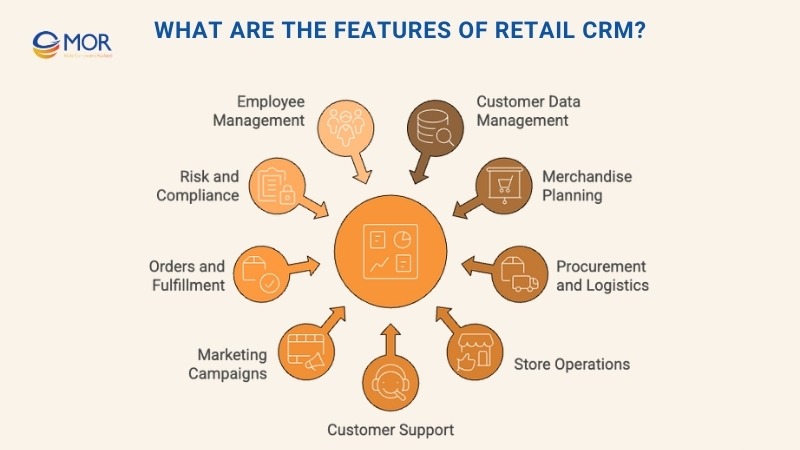
What Are The Features Of Retail CRM?
1. Managing Customer Data
Customer data management is one of the core functions of a retail CRM. It allows businesses to securely store and organize customer details, including contact information, purchase history, preferences, and interactions across multiple touchpoints. Having this data centralized gives retailers a complete customer view and makes it easier to identify buying behaviors and trends.
With these insights, businesses can personalize marketing campaigns, recommend products more effectively, and deliver promotions that match customer interests. Advanced segmentation tools also let retailers group audiences by demographics, spending patterns, or engagement levels, ensuring campaigns are both relevant and impactful. Through applying this approach, retail CRM systems help companies build stronger connections, drive engagement, and improve both sales and loyalty.
2. Merchandise Planning
Merchandise management is a core function of retail CRM systems, giving businesses the ability to plan and optimize product assortments across channels, regions, and store locations. Using retail CRM software, companies can set pricing strategies for different products, customer groups, and sales channels based on real-time data analysis. This approach helps retailers remain competitive while maximizing profitability.
These systems also support automated workflows for product launches, simplifying how new items are introduced across multiple markets. In addition, powerful analytics provide visibility into sales volumes, customer demographics, and top-performing products. With these insights, businesses can forecast sales, identify trends, and make data-driven adjustments to pricing, assortment, and promotional strategies.
3. Procurement And Logistics
Alongside merchandise planning, CRM software for retail plays a significant role in procurement and logistics by improving supply chain efficiency. Retailers can manage supplier relationships, automate purchasing tasks, and streamline workflows for requisitions, approvals, and vendor onboarding. Centralized data on suppliers makes it easier to optimize purchasing decisions, lower costs, and strengthen the supply chain.
A retail CRM also enhances collaboration with vendors, manufacturers, and distributors by providing a shared database for communication and coordination. With advanced document management tools, contracts and agreements are securely stored, while automated workflows reduce paperwork and ensure compliance with regulatory standards. This structured approach enables retailers to keep procurement efficient and transparent.
4. Store Operations
A retail CRM system helps retail stores streamline operations and improve efficiency across multi-store or franchise networks. These systems simplify franchise management by creating smooth communication channels between locations and ensuring consistent processes and standards are maintained throughout the network.
With centralized tools, every store can track inventory levels in real time. This prevents stockouts, reduces overstocking, and ensures orders are fulfilled on time. Franchise managers can also review daily sales performance, monitor staffing schedules, and make smarter decisions on resource allocation. When accessing accurate data, retailers can adjust quickly to customer demand and maintain smoother store operations.
5. Customer Support
Customer service is another critical area where retail CRM delivers value. Thanks to centralizing all service requests, communication, and support tickets in one platform, CRM software for retail industry ensures customers receive faster and more consistent responses. Retailers can monitor resolution times, track inquiries, and simplify the entire support process.
With access to detailed customer profiles and interaction history, staff can anticipate needs and provide personalized solutions. This not only improves satisfaction but also encourages stronger loyalty and brand advocacy. Over time, delivering proactive and personalized support becomes a major differentiator for retailers.
6. Marketing Campaigns
With a retail CRM, businesses can plan, launch, and track marketing campaigns more effectively, improving customer engagement and long-term loyalty. Centralized customer data and segmentation tools allow teams to build targeted, omnichannel campaigns that reflect individual customer interests. Using insights, retailers can send personalized offers and tailored messages that resonate with their audience, raising the overall impact of each campaign.
Through automation features built into CRM in retail industry, teams can streamline campaign execution and maintain consistent messaging across every channel. Marketers can schedule communications, monitor performance in real time, and adjust strategies based on results. This reduces manual work, saves resources, and ensures campaigns drive maximum results.
Another advantage of using a retail CRM is the ability to run loyalty programs directly within the system. Businesses can design and manage reward structures that allow customers to earn and redeem points across channels, creating a seamless experience that encourages repeat purchases. Analyzing loyalty program performance, retailers can refine rewards and better align with customer expectations.
7. Orders And Fulfillment
A retail CRM provides omnichannel order management, enabling retailers to handle orders seamlessly across online, in-store, and mobile channels. With automated workflows and streamlined order processing, these systems reduce manual work and speed up fulfillment. Real-time visibility into inventory ensures accurate order routing to the right warehouse, supporting efficient stock management and on-time delivery.
In addition, CRM software for retail strengthens delivery operations by automating key steps such as calculating shipping costs, coordinating with logistics partners, and optimizing delivery routes. Customers receive automated updates at every stage of the process, which builds trust, improves transparency, and minimizes support inquiries about order status.
A retail CRM also simplifies returns and exchanges by centralizing management within the platform. Retailers can track return requests, update inventory, and process refunds or replacements quickly. This smooth return experience not only saves time but also enhances customer satisfaction and loyalty.
8. Risk And Compliance
A retail CRM helps businesses maintain customer privacy and meet regulatory standards by offering tools that protect sensitive information. With features like encryption, access controls, and compliance monitoring, retail CRM systems ensure data security and uphold privacy requirements.
Many platforms also include options for managing consent preferences, so retailers can capture and track permissions in line with regulations such as GDPR. Consolidating customer data and applying strict privacy measures, retailers can minimize risks tied to data breaches while protecting customer trust.
9. Employee Management
Beyond customers, CRM software for retail industry also improves the employee journey from hiring to retention. These systems automate tasks like onboarding, performance reviews, and training initiatives, making HR workflows more efficient. Features for attendance tracking, scheduling, and payroll management further reduce administrative strain and keep operations smooth.
A retail CRM also strengthens teamwork by centralizing communication and knowledge-sharing. Built-in tools such as chat and document sharing support real-time collaboration, enabling staff to work together more effectively and stay aligned across departments.
What Are The Benefits Of Retail CRM?
Have you ever stored customer names, emails, or order details in a spreadsheet? If so, you’ve already started building a customer database without calling it a CRM. Many small retailers also rely on point-of-sale systems as a substitute, but these methods quickly become messy and unreliable as businesses grow.
At some point, upgrading to a dedicated retail CRM is the smarter move. It’s designed to organize customer information in a structured, actionable way. For sales teams, this kind of tool transforms how they interact with customers and creates a smoother overall shopping experience. In fact, adopting CRM in retail industry settings often gives businesses a clear edge over competitors who still rely on basic tracking systems.
There are several advantages to adopting a retail CRM in your stores. Beyond helping manage sales data, it empowers your team to deliver a more personalized customer journey. With the right system, every interaction becomes more strategic and more consistent.
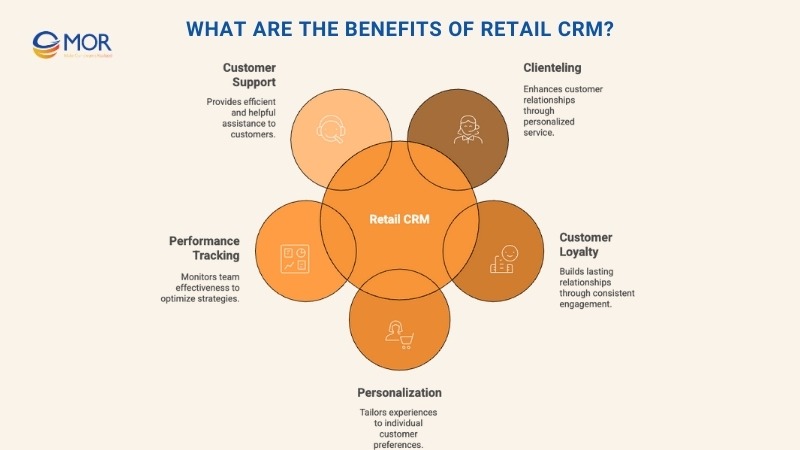
Driving Clienteling With Retail CRM
One of the biggest benefits of a retail CRM is its role in supporting clienteling. Clienteling is the practice of using customer data to create strong, long-term relationships that drive loyalty and repeat business. On a small scale, you can do this manually with a few customers, but for growing retailers, a CRM makes it possible to scale personalization without losing quality. It enables staff to track preferences, recommend products, and maintain meaningful touchpoints with customers over time.
Strengthening Customer Loyalty With Retail CRM
Attracting new shoppers is always important, but building loyalty among existing ones is just as valuable.
A retail CRM becomes especially useful once a customer is acquired and the focus shifts to long-term engagement. It helps identify which incentives or rewards customers respond to most, while also keeping track of their reactions to past offers and services. As your retention strategy grows, a CRM can segment audiences to show which customers qualify for perks, tiers, or rewards within your loyalty program. Doing so, it creates a structured approach to keeping customers engaged and returning.
Driving Personalization Through Retail CRM
Another key strength of CRM retail is its ability to personalize customer interactions. Studies show that emails with personalized subject lines are 26% more likely to be opened, and the more tailored your message, the higher the conversion rate.
A retail CRM makes this possible by collecting and organizing data that allows for precise segmentation. The more information available, the easier it is to create messages and campaigns that feel highly relevant to each recipient, boosting engagement and sales.
Tracking Performance Across Retail Teams
For retail brands with 10, 20, or even 100 stores, keeping track of sales performance across teams can be a challenge. A retail CRM makes this task manageable by allowing managers to see exactly how each salesperson contributes to revenue. Most systems let staff “claim” customers or deals, creating clear accountability.
When teams know their outreach and follow-ups are being tracked, they become more thoughtful and strategic in how they approach buyers. Beyond that, a retail CRM software generates detailed reports that show the impact of each employee, whether by single transaction or overall customer portfolio. This visibility helps leadership spot top performers and identify areas for improvement.
Improving Customer Support With Retail CRM
A retail CRM also plays an important role in customer service. Many retailers face a gap between what corporate teams know about a shopper and what in-store staff can access. That disconnect often leads to frustration for the customer. An omnichannel CRM closes this gap by unifying all data in one place.
When every team member has access to a customer’s purchase history, preferences, and past interactions, support becomes seamless. The shopper doesn’t need to repeat information, and the experience feels far more personal. Using a CRM this way turns customer support into something memorable, making people more likely to return.
Best Practices For Selecting A Retail CRM
Choosing the right retail CRM is already half the journey toward building stronger customer relationships and smoother operations. The right platform should fit your budget, match your business needs, and deliver measurable value across sales, marketing, and service.
A carefully selected retail CRM helps businesses save time, cut unnecessary costs, and improve overall productivity. Below are proven best practices that guide retailers in identifying the most effective solution.
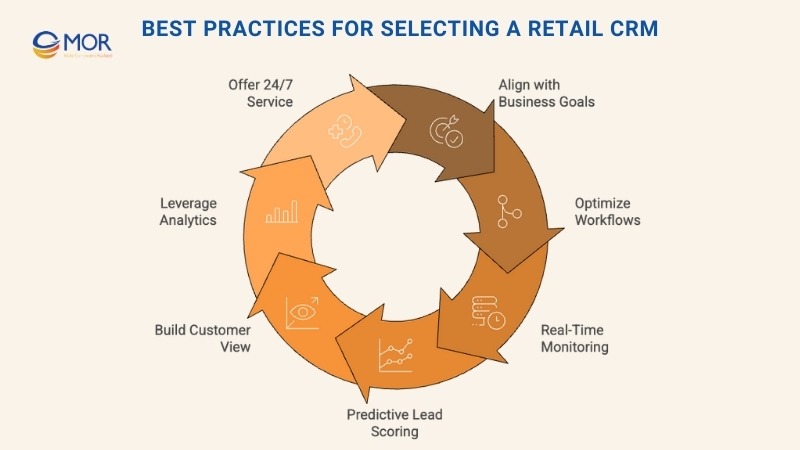
1. Match CRM With Business Goals
The best CRM software for retail aligns closely with business objectives, centralizing data, tasks, and customer interactions in one place. With this unified approach, teams can review complete customer histories that include purchases, communications, and transactions.
Modern tools also offer intuitive dashboards for sorting, searching, and organizing data. This allows staff to understand customer behavior on a deeper level, spot patterns quickly, and make smarter decisions that are directly connected to company goals.
2. Optimize Order And Delivery Workflows
A retail CRM streamlines the full order lifecycle, from placement to final delivery. It tracks customer orders step by step, monitors fulfillment progress, and ensures products arrive on time. Reducing errors and automating repetitive tasks, retailers gain efficiency and improve accuracy in every transaction.
This automation not only cuts down on delays but also enhances customer satisfaction by guaranteeing reliable and timely deliveries. For businesses competing in fast-moving markets, these features make a retail CRM an indispensable tool.
3. Use Real-Time Monitoring
Real-time monitoring is a powerful capability of CRM in retail industry solutions. It enables retailers to keep a close eye on sales metrics, inventory levels, customer interactions, and staff performance simultaneously. This visibility allows managers to respond quickly in dynamic environments where rapid adjustments are critical.
Leveraging live data, retailers can refine their marketing strategies on the fly, adapting to shifts in demand or changes in customer behavior. Real-time tracking ensures businesses remain agile and capable of making informed decisions at the right moment.
4. Apply Predictive Lead Scoring
Modern retail CRM platforms often use artificial intelligence and machine learning to deliver predictive lead scoring. These tools analyze customer behavior and purchase history to calculate the likelihood of a lead converting into a paying customer.
Applying predictive models, sales teams can prioritize the most promising leads and focus energy on those closest to conversion. This not only raises efficiency but also increases ROI by targeting efforts where they will have the most impact.
5. Build A Full 360° Customer View
A retail CRM software provides businesses with a complete, 360-degree perspective of customer activity across all touchpoints, whether in-store, online, or on mobile apps.
This holistic view makes it possible to deliver more personalized marketing and customer support. For instance, a furniture retailer could track a customer journey from website browsing to an in-store consultation and finally a mobile purchase. With all data unified, retailers can ensure consistent, tailored interactions at every stage.
6. Leverage Reporting And Analytics
A retail CRM gathers large volumes of customer and sales data that can be transformed into actionable insights. With built-in reporting tools, retailers can track important sales KPIs and evaluate performance across stores or teams.
In addition, advanced analytics highlight trends, patterns, and new opportunities for growth. These insights guide smarter business strategies, helping retailers plan future campaigns, refine pricing models, and ultimately increase revenue.
7. Offer 24/7 Customer Service
Many CRM software for retail industry solutions include dedicated customer support modules. These allow businesses to manage support tickets, reply to inquiries, and maintain open communication between customers and service teams.
The result is faster response times, quicker issue resolution, and a stronger overall customer experience. Ensuring reliable support around the clock, a retail CRM helps build trust and lasting loyalty.
Choosing MOR Software As Your Retail CRM Partner
When evaluating the right CRM for retail, technology is only half the story. The true difference lies in finding a partner who can tailor the system to your business model. MOR Software has a proven record of building and customizing CRM solutions for retailers, eCommerce companies, and global enterprises.
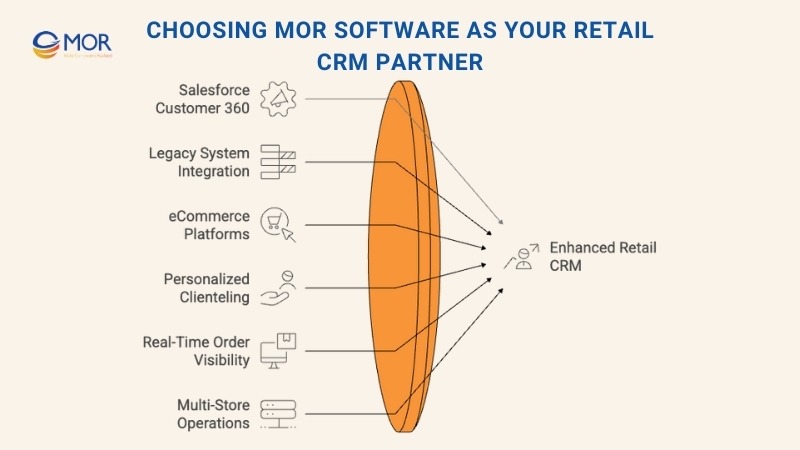
We have delivered Salesforce Customer 360 projects that unified marketing, sales, and service data. We’ve integrated legacy systems with Salesforce to streamline workforce and HR operations. Our teams have also developed large-scale eCommerce management platforms that synchronize orders and product information across multiple channels.
Working with us, retailers gain more than off-the-shelf software. We design solutions that reflect customer behavior, improve loyalty programs, and provide the reporting needed for smarter decisions. Whether the priority is personalized clienteling, real-time order visibility, or multi-store operations, we help retailers build a CRM that fits seamlessly with their growth strategy.
Conclusion
The right retail CRM can transform how you manage customer data, sales, and operations, driving both loyalty and revenue growth. Through choosing a solution tailored to your needs, you gain the tools to compete in today’s demanding retail environment. MOR Software specializes in designing and implementing CRM systems that deliver measurable results. Ready to build a smarter future for your business? Contact us today to get started.
Rate this article
0
over 5.0 based on 0 reviews
Your rating on this news:
Name
*Email
*Write your comment
*Send your comment
1